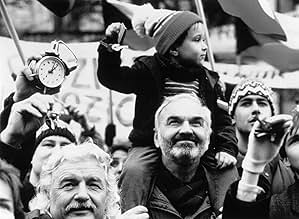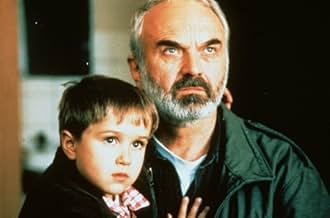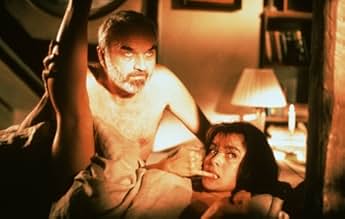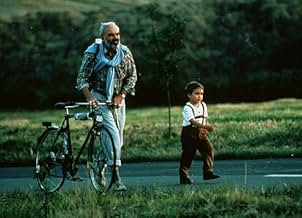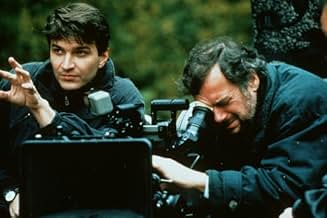VALUTAZIONE IMDb
7,7/10
16.673
LA TUA VALUTAZIONE
Aggiungi una trama nella tua linguaA confirmed bachelor is in for the surprise of his life when a get-rich-quick scheme backfires and leaves him with a pint-sized new roommate.A confirmed bachelor is in for the surprise of his life when a get-rich-quick scheme backfires and leaves him with a pint-sized new roommate.A confirmed bachelor is in for the surprise of his life when a get-rich-quick scheme backfires and leaves him with a pint-sized new roommate.
- Regia
- Sceneggiatura
- Star
- Vincitore di 1 Oscar
- 21 vittorie e 14 candidature totali
Zdenek Sverák
- Louka
- (as Zdeněk Svěrák)
Andrey Khalimon
- Kolja
- (as Andrej Chalimon)
Irina Bezrukova
- Nadezda
- (as Irina Livanova)
Liliyan Malkina
- Tamara
- (as Lilian Malkina)
Nela Boudová
- Brozová
- (as Nella Boudová)
Recensioni in evidenza
I watched this film last night on a open air cinema in Sundance and absolutely loved it!! The story is pretty simple and not very original, yet the film manages to be unique!! (it is very similar to the film Ponnette) But what I considered to be the best part of this movie was the little boy's performance. The kid is just the best kid actor I have seen in a long while. His acting not only is fabulous but REALLY touching and convincing.
I highly recommend this movie to anyone that wants to see a well made European movie that can make you laugh and cry at the same time.
I highly recommend this movie to anyone that wants to see a well made European movie that can make you laugh and cry at the same time.
I've seen a number of U.S. movies filmed in Czechoslovakia, but this is the first Czech film I've seen. Seeing this makes me understand how Czechoslovakia could have a fairly booming film industry.
This movie came on on cable network IFC and it first grabbed my attention because I didn't recognize what language the characters were speaking. Within a couple of minutes, however, the movie itself had hooked me, though it's not the type of story I'd usually seek out. Indeed I was late to work and really wanted to get going, but I was unable to tear myself away.
Beyond the great writing, acting, and directing, this film has some truly amazing cinematography. There are occasions where the filmmakers seem to have commanded the universe around them to get these shots. In one scene, the lead character looks up through his car's windshield as he's driving, and in perfect synchronization the reflection of the airliner he was looking at passes across the windshield. Even more amazing was the shot from well up in the air, with the lead characters' car driving up the road, a train going up a track in parallel to them, and a hawk (or eagle?) hovering right in front of the camera and then diving off to the side -- and they got this shot right at "magic hour". In Hollywood CGI surely would have been used to coordinate this ballet of elements.
There were also many shots incorporating wonderfully poetic imagery. One of my favorites was the lead character staring into the reflective doors at the airport which close and reveal him to himself, standing there utterly alone.
One more comment -- another reviewer called the ending "predictable", but I'd have to disagree. I really didn't know where the movie would end up, and in fact it was portrayed so subtly that I had to rewind the final scene to be sure what had happened, and then go back and re-watch a prior scene that contained a seemingly throwaway line that bears on the ending.
This movie came on on cable network IFC and it first grabbed my attention because I didn't recognize what language the characters were speaking. Within a couple of minutes, however, the movie itself had hooked me, though it's not the type of story I'd usually seek out. Indeed I was late to work and really wanted to get going, but I was unable to tear myself away.
Beyond the great writing, acting, and directing, this film has some truly amazing cinematography. There are occasions where the filmmakers seem to have commanded the universe around them to get these shots. In one scene, the lead character looks up through his car's windshield as he's driving, and in perfect synchronization the reflection of the airliner he was looking at passes across the windshield. Even more amazing was the shot from well up in the air, with the lead characters' car driving up the road, a train going up a track in parallel to them, and a hawk (or eagle?) hovering right in front of the camera and then diving off to the side -- and they got this shot right at "magic hour". In Hollywood CGI surely would have been used to coordinate this ballet of elements.
There were also many shots incorporating wonderfully poetic imagery. One of my favorites was the lead character staring into the reflective doors at the airport which close and reveal him to himself, standing there utterly alone.
One more comment -- another reviewer called the ending "predictable", but I'd have to disagree. I really didn't know where the movie would end up, and in fact it was portrayed so subtly that I had to rewind the final scene to be sure what had happened, and then go back and re-watch a prior scene that contained a seemingly throwaway line that bears on the ending.
What is a man to do who has resisted marriage until late middle age but then enters into a fraudulent marriage of convenience and ends up solely responsible for a five year old in the bargain? That is Franta Louka's dilemma in this beautiful film.
Louka, played by Zdenek Sverak who also wrote the screenplay, is a onetime philharmonic cellist who has lost his orchestra job because the Soviet era Czech communist powers-that-be deem him unreliable. As a consequence Louka has been reduced to playing at weddings and funerals and re-gilding cemetery tombstones. He has no car and is deeply in debt. In order to finance a car and reduce his debt Louka lets a coworker from the cemetery convince him to marry a Russian woman so that she can emigrate to the West. Louka reluctantly agrees and married the woman but the Russian decamps. This ultimately results in Louka becoming solely responsible for the woman's five year old boy -- who only speaks Russian.
Louka and the little boy's relationship is both believable and moving. "Kolya" is very nearly a great film. Highly, highly recommended. 9 out of 10.
Louka, played by Zdenek Sverak who also wrote the screenplay, is a onetime philharmonic cellist who has lost his orchestra job because the Soviet era Czech communist powers-that-be deem him unreliable. As a consequence Louka has been reduced to playing at weddings and funerals and re-gilding cemetery tombstones. He has no car and is deeply in debt. In order to finance a car and reduce his debt Louka lets a coworker from the cemetery convince him to marry a Russian woman so that she can emigrate to the West. Louka reluctantly agrees and married the woman but the Russian decamps. This ultimately results in Louka becoming solely responsible for the woman's five year old boy -- who only speaks Russian.
Louka and the little boy's relationship is both believable and moving. "Kolya" is very nearly a great film. Highly, highly recommended. 9 out of 10.
10CBW-2
I did not think this film was at all sentimental (if you are using the word in its pejorative sense). In reading the comments on this film, I noticed the Czechs who responded were rather lukewarm about it. This surprises me. Kolya works as a film on several levels at once -- political, artistic, personal, etc. and I do not think it is at all predictable. The performances are magical and the entire film is encased by music of very great beauty and humanity by Dvorak and other great Czech composers. Music from Dvorak's "Four Biblical Songs" is at the heart of the film. It is the song that Klara sings at the funerals and the song Kolya is singing before and during the closing credits. The vintage film footage of Kubelik conducting Smetana's Ma Vlast at a concert at the end of the Russian occupation is a wonderful touch. Although I'm sure many other Czech films deserve Oscars, I am glad Kolya was recognized. I hope this film is released on DVD soon.
I like this movie very much and I am glad to read that most of you like it too. However, some comments here describe it as predictable and having the funny parts far from one another. It is not true. There are two more things that you cannot appreciate: 1) The background. I am a Czech myself and I remember the times which the film speaks about. There are many little details that probably come and go unnoticed for the foreigner eye but each of them is a symbol - it carries meaning that is so obvious for a Czech viewer. 2) The language is FUNNY! Sverak (the author) is a well known writer here. He is a GENIUS with the language, it's full of sweet little word puns that can never be translated into another language. You can translate the data, the information - but you lose the atmosphere. Believe me, even in the parts that look boring, there is something hidden between the lines - it's either funny, emotional, powerful... There is another great thing with playing with the differences between Czech and Russian. The languages are similar (to some extend) but there are differences that can result in misunderstandings - and they use it in the movie too. Czech people used to learn Russian language at schools so they can appreciate it.
I am so sorry that there is no way that you could enjoy even these parts of the movie. (Unless you'd want to learn Czech of course :-)
Just please, please, bear in mind that this is not just a shallow romantic movie. Yes, it is lovely - but there is more than that.
I am so sorry that there is no way that you could enjoy even these parts of the movie. (Unless you'd want to learn Czech of course :-)
Just please, please, bear in mind that this is not just a shallow romantic movie. Yes, it is lovely - but there is more than that.
Lo sapevi?
- QuizThe child actor who plays Kolja, Andrey Khalimon, was not cast until three weeks before filming started.
- BlooperThroughout the movie, many background cars are clearly newer than 1989 models. The film is set in 1989.
- ConnessioniFeatured in 54th Golden Globe Awards (1997)
I più visti
Accedi per valutare e creare un elenco di titoli salvati per ottenere consigli personalizzati
- How long is Kolya?Powered by Alexa
Dettagli
- Data di uscita
- Paesi di origine
- Sito ufficiale
- Lingue
- Celebre anche come
- Коля
- Luoghi delle riprese
- Aziende produttrici
- Vedi altri crediti dell’azienda su IMDbPro
Botteghino
- Lordo Stati Uniti e Canada
- 5.770.254 USD
- Lordo in tutto il mondo
- 5.770.254 USD
- Tempo di esecuzione
- 1h 51min(111 min)
- Colore
- Mix di suoni
- Proporzioni
- 1.66 : 1
Contribuisci a questa pagina
Suggerisci una modifica o aggiungi i contenuti mancanti


